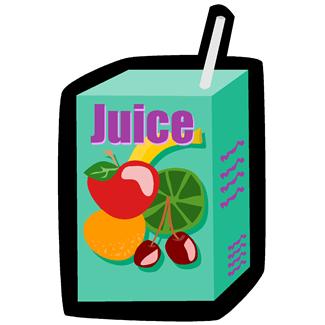Mysterious (or should I say juicy? ;)) blog title, eh? Here are a couple excerpt from an upcoming book review and giveaway….
A Juicy Update
The answer to whether or not young children should be allowed to drink juice on a regular basis has been a bit of a sticky one for years. After all, the fight against childhood obesity has most definitely included a focus on limiting sugary liquids. And juice—whether it is delivered in a box or carton, sippy cup or straw—most definitely contains sugar. In fact, when we set out to write the first edition of Food Fights, the latest research at the time had us all but convinced that fruit juice was almost as much to blame for childhood obesity (not to mention tooth decay) as soda pop. Sugar was sugar, after all, and it was hard to look past the fact that a 12-ounce serving of 100% grape juice had been shown to have 11/2 times the calories as grape soda. Additionally, a few small initial studies suggested a worrisome connection between obesity in young children and their fruit juice consumption. But unlike soda pop and its utter lack of redeeming nutritional qualities, 100% fruit juice has since proven itself significantly more worthy of further nutritional consideration. Several subsequent large national studies have revealed some interesting findings about kids, juice, nutrition, and obesity, not the least of which has been the lack of an association between drinking 100% fruit juice and an increased likelihood of children being or becoming overweight. These new findings have led us to reassess our take on juice, and to reformulate our own juice-related advice for parents accordingly.
A Convenient Juice Box
If and when you plan on incorporating juice into your child’s diet responsibly,we suggest the following approach:
• Make sure it’s pure fruit juice. Fruit drinks that aren’t 100% juice typically
contain added sugars and/or sweeteners that can up both the cavity and
calorie counts.
• Hold off on introducing your child to juice for at least his first year and
refrain from serving it in a bottle.
• Avoid letting your child sip on juice (or any other sugar-containing liquid,
for that matter) for prolonged periods. Whether by bottle, sippy cup, or
cup, bathing one’s teeth in sugary liquids can cause serious tooth decay.
• Consider diluting it with water.
• Encourage your child to eat fresh, whole fruits whenever available.
• Whenever possible, serve juice that contains pulp for added fiber.
• Make sure juice doesn’t entirely drown out your child’s interest in drinking
milk and water.
• Buy only pasteurized products (shelf-stable juices, frozen concentrates,
or specially marked refrigerated juices) to avoid potential diarrhea-causing
infections.
• While the American Academy of Pediatrics does suggest 100% fruit juice
as an acceptable part of a healthy diet, be aware that it’s wise to offer it in
age-appropriate moderation (none under 6 months of age and no more
than 4 to 6 ounces a day for older infants and children).
• Keep an eye out for warning signs of excessive juice intake, such as tooth
decay and “toddler’s diarrhea.” Not only do young kids tend to suck on
sugary liquids for prolonged periods when allowed, thus putting their newly
acquired teeth at considerable risk., but kids
between the ages of 2 and 3 tend to have the highest juice consumption—
in some instances enough to cause persistent diarrhea.
Come back Friday to learn more about the book and giveaway!





















Until I was a parent, I didn’t realize what a huge difference there was between juices and the healthiness of different brands.
My children only get one cup of juice a day. Everything else is either water or milk.
We give little man juice if it’s 100% juice, and still not so much (about one or two cups a day)
I’m kind of a juice nazi. I only allow 1 cup of 100% juice per day MAX with my kids. Fruit has natural sugar and too much is still too much.
My kids don’t really like juice all that much. They prefer water or chocolate milk. But on occasion, I’ll give them some apple juice or cranberry but they don’t like the tartness so I hardly buy them.
Very interesting info. Thanks!